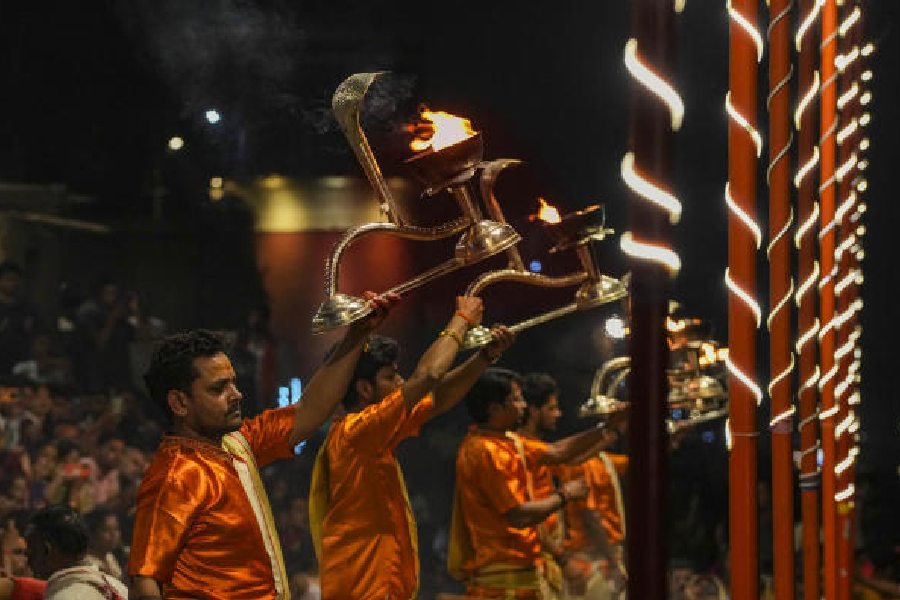Bazeecha-e-atfal hai duniya mere aage, hota hai shab-o-roz tamasha mere aage (The world is a children’s playground before me, night and day this theatre is enacted before me).
Mirza Ghalib is forgotten in Varanasi though his verses live on.
Ghalib arrived in Banaras in debt on his way to Calcutta to meet officials of the East India Company in an attempt to restore his pension. It’s said that the land of moksha gave him fresh perspectives on life and he heaped praises about Banaras in his long poem Chirag-e-Dair.
Scholars differ on how long he stayed in Banaras — some say about one-and-a-half months, others claim it was four months.
On December 31, 1860, Ghalib wrote to his friend Sayyad: “I like Banaras, a fine city. I have written a poem, Chirag-e-Dair (The Lamp of the Temple) in Persian verses.”
There are 108 verses in this collection of which 69 are directly in praise of Banaras. He wrote to his friend Mohammad Ali Khan: “This city is so lovely that one forgets his sufferings. Had I no fear of religious contempt, I would have discarded my religion and started counting beads (mala japana)…I would have spent my life on the banks of the Ganga.”
Cut to Varanasi.
More than moksha (liberation), the city is now reputable for paksh (taking sides). People no longer remember the likes of Ghalib. Even during elections, an ideal time for political parties to capitalise on him, most organisations steer clear of using his name or works to avoid being branded.
Unhappy with such a situation, a few youths from Varanasi, who share an interest in poetry, have written to a few political parties to build a memorial of the poet in Varanasi.
“Ghalib is not someone who could be easily forgotten. Whatever he did here, suits all. The RSS, the BJP, the Congress and the Samajwadi Party — they should all think about making his memorial here,” said Sultan Ahmad, a postgraduate in Urdu from Darul Uloom Deoband, Saharanpur, who also teaches in a madrasa here.
It’s not just the Muslims craving for a spotlight on Ghalib. Even informed Hindus are seeking due recognition for the Urdu poet’s connection with Varanasi.
Anand Kumar, a former student of Banaras Hindu University (BHU), who now runs a library in the Chowk area of Varanasi, says: “We all know Ghalib wrote more in Urdu than in Persian and he used to say Hindi (Hindavi) was his language of poetry. The Hindutva parties shouldn’t have any problem in developing a centre in his name.
“We have written to many leaders and are in the process of writing to many more because we hope they would listen to us during the elections and promise us to do something about it,” Anand adds.
Rana P.B. Singh, 73, who retired from BHU as a professor of geography and has an interest in cultural landscape and heritage studies, tells The Telegraph: “Ye ek vichitra shahar hai, yahan heritage ko bachane ke liye kuch nahi hota. (It is a strange city. Nothing is being done to protect its heritage).”
Prime Minister Narendra Modi, seeking re-election from the seat for the third consecutive term, claims he is developing Kashi while preserving its culture and heritage. Old-timers, however, believe that culture for Modi is nothing but religion.
Singh has written a lot about Ghalib’s Banaras sojourn.
“Ghalib reached here in August-September 1827 and stayed for four months. He initially stayed here in Sarai, Aurangabad area and then in the palace of Mirza Ghulam Ahmad (founder of Ahmadiyya movement in Islam). He wrote his best Persian poetry here,” he says.
He adds: “Varanasi could be restored as a great city but I don’t know why nothing was done. It was not only Ghalib, even (Greek artist) Demetrios Galanis had lived here. (English scholar) James Prinsep, too, lived here for many years.”
Ajay Rai, a veteran journalist, said even Dara Shikoh (son of Mughal emperor Shah Jahan) lived here and learnt Sanskrit in Aurangabad.
“Aurangabad was the upscale neighbourhood of the 18th and 19th centuries. If you see the facades of the old houses there, you will realise they were the palaces of those times. The properties were either split in the family or encroached upon by crooks during or before Partition,” Rai says, adding, that Varanasi is more than just the Kashi Vishwanath temple, the Ganga and its streets.
“It is more than sectarian politics, which is intensely preached here these days. Unfortunately, those who want to ignore Tulsidas and Kabir (who also lived here) must be sufficiently cold-blooded to forget Ghalib, Prinsep or Dara Shikoh,” Rai says, adding: “Hota hai shab-o-roz tamasha mere aage.”
Varanasi votes on June 1










